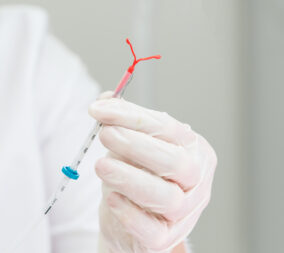A recent study from Denmark has sparked discussions about whether progesterone-containing intrauterine devices (IUDs) are linked to an increased risk of breast cancer. IUDs are well-known as a safe and highly effective form of birth control. They offer additional benefits, like reducing heavy menstrual bleeding, cramps, and lowering the risk of ovarian and uterine cancers. However, the study did show a slightly increased breast cancer risk for women who had used progesterone-containing IUDs compared to those who hadn’t. This post will break down the study findings to help you make informed decisions about IUD use.
The case-control study, published as a research letter in JAMA, found that women using progesterone-containing IUDs had 14 extra cases of breast cancer per 10,000 woman-years. But what does this mean? In simple terms, for every 10,000 women who use a progesterone IUD for one year, about 14 more women may develop breast cancer. This amounts to a 0.14% increase in risk, or 1 extra case for every 714 women using the IUD over one year. While this does constitute an increased risk associated with the IUD, the overall risk remains very small.
To put things in perspective, breast cancer is common—about 13% of women in the U.S. (around 1 in 8) will develop it over their lifetime. So, compared to the baseline risk of breast cancer, the added risk from using a progesterone IUD is tiny. Additionally, there are many other factors that affect breast cancer risk.
For example:
• Obesity adds around 25 extra cases of breast cancer per 10,000 woman-years.
• Alcohol use contributes 7-11 extra cases depending on consumption levels.
• Physical inactivity adds about 13 extra cases.
• Having a family history or certain genetic mutations, like BRCA1 or BRCA2, can dramatically increase your risk of breast cancer.
It’s important to note that this study did not control for obesity, a known risk factor for breast cancer, and progesterone IUDs are frequently used in women with obesity due to their elevated risk of uterine cancer. So, while the study found a small increase in breast cancer risk, many other factors, including lifestyle choices and genetics, play a much larger role in breast cancer development.
When making health decisions, it’s crucial to weigh the benefits and risks. While this study shows a slight increase in breast cancer risk from progesterone-containing IUDs, these devices offer many benefits. They reduce the risk of ovarian and uterine cancer (about 10 fewer cases of ovarian cancer and 20-30 fewer cases of uterine cancer per 10,000 woman-years), help prevent anemia from heavy bleeding, relieve endometriosis pain, and provide reliable contraception.
In deciding whether to use or keep an IUD, it’s essential to consider your overall health and reproductive priorities. If an IUD meets your menstrual or contraceptive needs, or helps treat endometrial issues, focusing on modifiable risk factors like maintaining a healthy weight, limiting alcohol, and staying active might be the best way to lower your breast cancer risk.
Ultimately, while progesterone IUDs may be associated with a slight increase in breast cancer risk, there are other factors that have a much more significant impact. And let’s not forget that IUDs otherwise offer substantial health benefits for many women.
Reference: Mørch LS, Meaidi A, Corn G, Hargreave M, Wessel Skovlund C. Breast Cancer in Users of Levonorgestrel-Releasing Intrauterine Systems. JAMA. 2024 Oct 16. doi: 10.1001/jama.2024.18575. Epub ahead of print. PMID: 39412770.


















